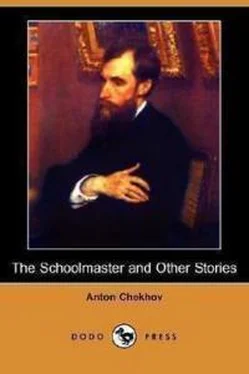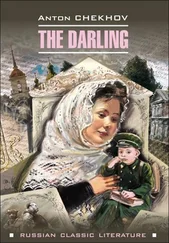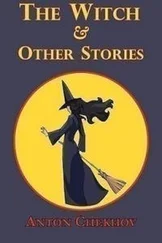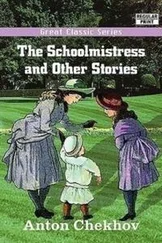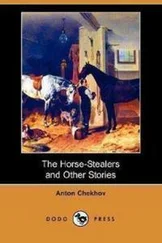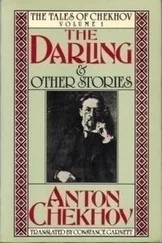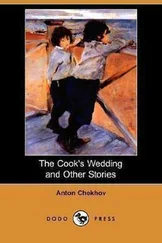"I'll give you the wood, Kuzma Kuzmitch."
Zamuhrishen asks for and gets a cow too, a letter of recommendation for his daughter whom he wants to send to a boarding school, and …touched by the lady's liberality he whimpers with excess of feeling, twists his mouth, and feels in his pocket for his handkerchief ….
Marfa Petrovna sees a red paper slip out of his pocket with his handkerchief and fall noiselessly to the floor.
"I shall never forget it to all eternity … " he mutters, "and I shall make my children and my grandchildren remember it … from generation to generation. 'See, children,' I shall say, 'who has saved me from the grave, who … '"
When she has seen her patient out, the lady looks for a minute at Father Aristark with eyes full of tears, then turns her caressing, reverent gaze on the drug chest, the books, the bills, the armchair in which the man she had saved from death has just been sitting, and her eyes fall on the paper just dropped by her patient. She picks up the paper, unfolds it, and sees in it three pilules—the very pilules she had given Zamuhrishen the previous Tuesday.
"They are the very ones," she thinks puzzled. "…The paper is the same…. He hasn't even unwrapped them! What has he taken then? Strange…. Surely he wouldn't try to deceive me!"
And for the first time in her ten years of practice a doubt creeps into Marfa Petrovna's mind…. She summons the other patients, and while talking to them of their complaints notices what has hitherto slipped by her ears unnoticed. The patients, every one of them as though they were in a conspiracy, first belaud her for their miraculous cure, go into raptures over her medical skill, and abuse allopath doctors, then when she is flushed with excitement, begin holding forth on their needs. One asks for a bit of land to plough, another for wood, a third for permission to shoot in her forests, and so on. She looks at the broad, benevolent countenance of Father Aristark who has revealed the truth to her, and a new truth begins gnawing at her heart. An evil oppressive truth….
The deceitfulness of man!
"THE wind has got up, friends, and it is beginning to get dark. Hadn't we better take ourselves off before it gets worse?"
The wind was frolicking among the yellow leaves of the old birch trees, and a shower of thick drops fell upon us from the leaves. One of our party slipped on the clayey soil, and clutched at a big grey cross to save himself from falling.
"Yegor Gryaznorukov, titular councillor and cavalier . ." he read. "I knew that gentleman. He was fond of his wife, he wore the Stanislav ribbon, and read nothing…. His digestion worked well … . life was all right, wasn't it? One would have thought he had no reason to die, but alas! fate had its eye on him…. The poor fellow fell a victim to his habits of observation. On one occasion, when he was listening at a keyhole, he got such a bang on the head from the door that he sustained concussion of the brain (he had a brain), and died. And here, under this tombstone, lies a man who from his cradle detested verses and epigrams…. As though to mock him his whole tombstone is adorned with verses…. There is someone coming!"
A man in a shabby overcoat, with a shaven, bluish–crimson countenance, overtook us. He had a bottle under his arm and a parcel of sausage was sticking out of his pocket.
"Where is the grave of Mushkin, the actor?" he asked us in a husky voice.
We conducted him towards the grave of Mushkin, the actor, who had died two years before.
"You are a government clerk, I suppose?" we asked him.
"No, an actor. Nowadays it is difficult to distinguish actors from clerks of the Consistory. No doubt you have noticed that…. That's typical, but it's not very flattering for the government clerk."
It was with difficulty that we found the actor's grave. It had sunken, was overgrown with weeds, and had lost all appearance of a grave. A cheap, little cross that had begun to rot, and was covered with green moss blackened by the frost, had an air of aged dejection and looked, as it were, ailing.
"…forgotten friend Mushkin … " we read.
Time had erased the never , and corrected the falsehood of man.
"A subscription for a monument to him was got up among actors and journalists, but they drank up the money, the dear fellows … " sighed the actor, bowing down to the ground and touching the wet earth with his knees and his cap.
"How do you mean, drank it?"
That's very simple. They collected the money, published a paragraph about it in the newspaper, and spent it on drink…. I don't say it to blame them…. I hope it did them good, dear things! Good health to them, and eternal memory to him."
"Drinking means bad health, and eternal memory nothing but sadness. God give us remembrance for a time, but eternal memory—what next!"
"You are right there. Mushkin was a well–known man, you see; there were a dozen wreaths on the coffin, and he is already forgotten. Those to whom he was dear have forgotten him, but those to whom he did harm remember him. I, for instance, shall never, never forget him, for I got nothing but harm from him. I have no love for the deceased."
"What harm did he do you?"
"Great harm," sighed the actor, and an expression of bitter resentment overspread his face. "To me he was a villain and a scoundrel—the Kingdom of Heaven be his! It was through looking at him and listening to him that I became an actor. By his art he lured me from the parental home, he enticed me with the excitements of an actor's life, promised me all sorts of things—and brought tears and sorrow…. An actor's lot is a bitter one! I have lost youth, sobriety, and the divine semblance…. I haven't a half–penny to bless myself with, my shoes are down at heel, my breeches are frayed and patched, and my face looks as if it had been gnawed by dogs…. My head's full of freethinking and nonsense…. He robbed me of my faith—my evil genius! It would have been something if I had had talent, but as it is, I am ruined for nothing…. It's cold, honoured friends…. Won't you have some? There is enough for all…. B–r–r–r…. Let us drink to the rest of his soul! Though I don't like him and though he's dead, he was the only one I had in the world, the only one. It's the last time I shall visit him…. The doctors say I shall soon die of drink, so here I have come to say good–bye. One must forgive one's enemies."
We left the actor to converse with the dead Mushkin and went on. It began drizzling a fine cold rain.
At the turning into the principal avenue strewn with gravel, we met a funeral procession. Four bearers, wearing white calico sashes and muddy high boots with leaves sticking on them, carried the brown coffin. It was getting dark and they hastened, stumbling and shaking their burden….
"We've only been walking here for a couple of hours and that is the third brought in already…. Shall we go home, friends?"
IVAN YEGORITCH KRASNYHIN, a fourth–rate journalist, returns home late at night, grave and careworn, with a peculiar air of concentration. He looks like a man expecting a police–raid or contemplating suicide. Pacing about his rooms he halts abruptly, ruffles up his hair, and says in the tone in which Laertes announces his intention of avenging his sister:
"Shattered, soul–weary, a sick load of misery on the heart … and then to sit down and write. And this is called life! How is it nobody has described the agonizing discord in the soul of a writer who has to amuse the crowd when his heart is heavy or to shed tears at the word of command when his heart is light? I must be playful, coldly unconcerned, witty, but what if I am weighed down with misery, what if I am ill, or my child is dying or my wife in anguish!"
Читать дальше
